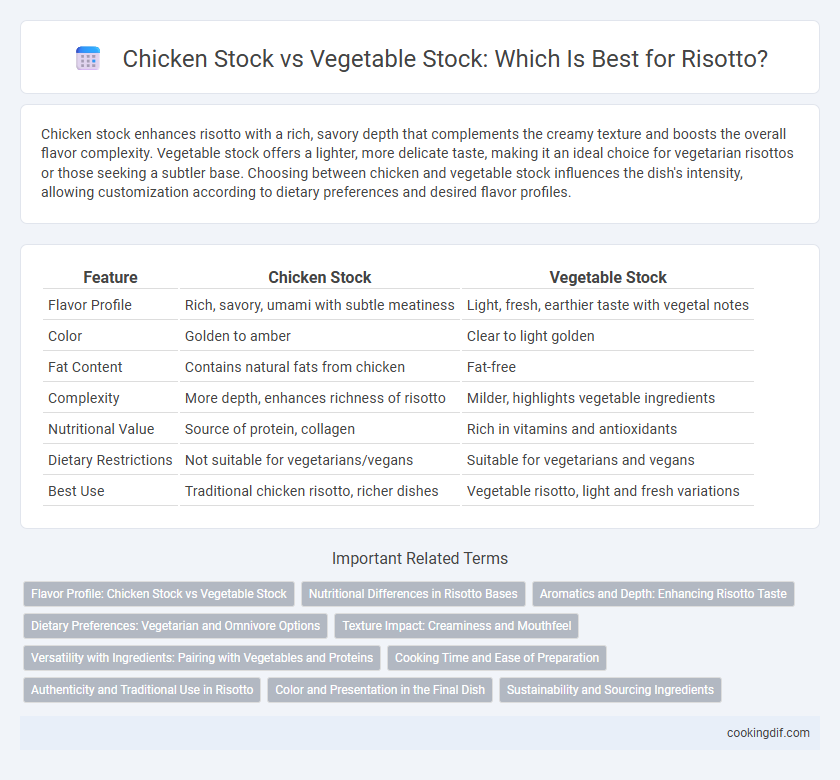Chicken stock enhances risotto with a rich, savory depth that complements the creamy texture and boosts the overall flavor complexity. Vegetable stock offers a lighter, more delicate taste, making it an ideal choice for vegetarian risottos or those seeking a subtler base. Choosing between chicken and vegetable stock influences the dish's intensity, allowing customization according to dietary preferences and desired flavor profiles.
Table of Comparison
| Feature | Chicken Stock | Vegetable Stock |
|---|---|---|
| Flavor Profile | Rich, savory, umami with subtle meatiness | Light, fresh, earthier taste with vegetal notes |
| Color | Golden to amber | Clear to light golden |
| Fat Content | Contains natural fats from chicken | Fat-free |
| Complexity | More depth, enhances richness of risotto | Milder, highlights vegetable ingredients |
| Nutritional Value | Source of protein, collagen | Rich in vitamins and antioxidants |
| Dietary Restrictions | Not suitable for vegetarians/vegans | Suitable for vegetarians and vegans |
| Best Use | Traditional chicken risotto, richer dishes | Vegetable risotto, light and fresh variations |
Flavor Profile: Chicken Stock vs Vegetable Stock
Chicken stock offers a rich, savory flavor with a depth of umami that enhances the creamy texture of risotto, providing a more robust and hearty taste. Vegetable stock presents a lighter, fresher flavor profile, allowing the natural ingredients like mushrooms, asparagus, or herbs in the risotto to stand out more distinctly. Choosing between chicken and vegetable stock depends on the desired intensity; chicken stock deepens complexity, while vegetable stock maintains a clean, vibrant palate.
Nutritional Differences in Risotto Bases
Chicken stock offers higher protein content and essential amino acids compared to vegetable stock, enhancing the nutritional profile of risotto. Vegetable stock provides lower calories and fat, along with increased vitamins and antioxidants from diverse vegetables. Choosing between these bases affects not only flavor but also the vitamin, mineral, and macronutrient balance in the final risotto dish.
Aromatics and Depth: Enhancing Risotto Taste
Chicken stock offers richer aromatics and deeper umami flavors compared to vegetable stock, creating a more savory and robust base for risotto. Vegetable stock provides a lighter, fresher taste with subtle herbal notes, ideal for maintaining delicate ingredient flavors. Choosing chicken stock enhances complexity and depth, while vegetable stock emphasizes clarity and brightness in the final dish.
Dietary Preferences: Vegetarian and Omnivore Options
Chicken stock offers a rich, savory base ideal for omnivores seeking deep flavor in risotto, while vegetable stock provides a lighter, plant-based alternative suitable for vegetarians and vegans. Using vegetable stock ensures the dish remains free from animal products without sacrificing the broth's aromatic essence, often enhanced by mushrooms, herbs, and vegetables. Selecting the stock based on dietary preferences allows for versatile risotto recipes catering to diverse taste and nutritional requirements.
Texture Impact: Creaminess and Mouthfeel
Chicken stock enhances risotto's creaminess by releasing gelatin during cooking, resulting in a richer, silkier texture and a fuller mouthfeel. Vegetable stock tends to yield a lighter, less viscous consistency, which can lead to a more delicate but sometimes less luxurious creamy texture. The collagen and amino acids in chicken stock contribute significantly to the velvety finish that defines classic risotto.
Versatility with Ingredients: Pairing with Vegetables and Proteins
Chicken stock provides a rich, savory base that enhances the flavor of meats like chicken, pork, and seafood in risotto, creating a hearty, well-rounded dish. Vegetable stock offers a lighter, more neutral foundation, allowing the natural flavors of ingredients such as mushrooms, asparagus, and peas to shine while accommodating vegetarian or vegan preferences. Both stocks contribute to versatility in risotto recipes by complementing different vegetables and proteins, influencing the overall depth and complexity of the final dish.
Cooking Time and Ease of Preparation
Chicken stock often imparts a richer flavor to risotto while requiring longer simmering times to extract full taste from bones and aromatics. Vegetable stock offers a quicker preparation alternative, as it can be made by simmering vegetables for 30 to 45 minutes, suitable for faster cooking needs. Choosing vegetable stock simplifies the process for vegetarians and reduces cooking time without sacrificing the essential liquid base for rice absorption.
Authenticity and Traditional Use in Risotto
Traditional Italian risotto recipes commonly use chicken stock as the base, providing a rich and savory flavor that enhances the creaminess and depth of the dish. Authentic risotto relies on the gelatin and natural fats from chicken stock to create the signature smooth texture and robust taste that vegetable stock often lacks. While vegetable stock offers a lighter, vegetarian alternative, it does not deliver the same complexity and traditional richness crucial to classic risotto preparation.
Color and Presentation in the Final Dish
Chicken stock imparts a rich golden hue to risotto, enhancing the dish's visual warmth and making the presentation more inviting. Vegetable stock tends to produce a paler, more translucent base, resulting in a lighter, more subdued color that highlights garnishes and fresh herbs. Choosing chicken stock elevates the dish's depth of color, while vegetable stock offers a cleaner, more delicate appearance for a refined presentation.
Sustainability and Sourcing Ingredients
Using vegetable stock as the base for risotto supports sustainability by reducing environmental impact through lower resource consumption and emissions compared to chicken stock. Sourcing local, organic vegetables for stock enhances traceability and minimizes carbon footprint, aligning with eco-friendly culinary practices. Choosing vegetable stock also promotes plant-based eating trends, contributing to biodiversity preservation and ethical food production.
Chicken stock vs vegetable stock for base Infographic

 cookingdif.com
cookingdif.com